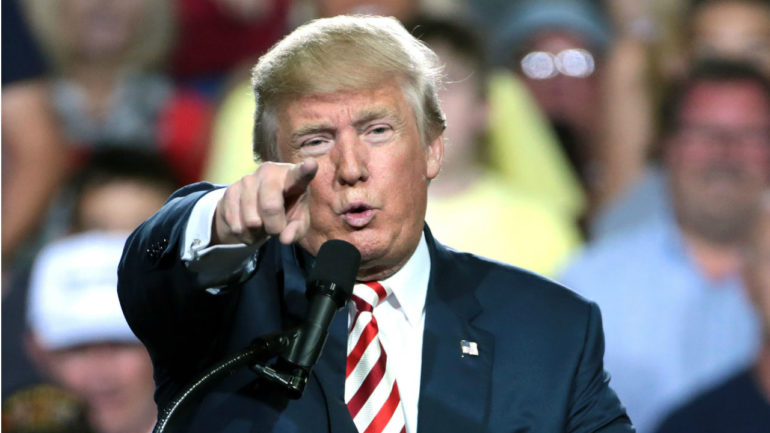The ousted director of the office involved in developing a coronavirus vaccine has quit his post at the National Institutes of Health, charging that the Trump administration “ignores scientific expertise, overrules public health guidance and disrespects career scientists”.
Dr Rick Bright, a whistleblower who crossed swords with the Trump administration over claims his warnings over both coronavirus and the utility of hydroxychloroquine were ignored, left his role complaining that his plan to develop a national testing infrastructure had also been sidelined.
Bright is an immunologist who formerly headed the Biomedical Advanced Research and Development Authority, a department of health and human services (HHS) agency that works to prepare the nation for such threats as a pandemic or a bioterrorism attack. That agency is now playing a central role in the campaign to deliver a coronavirus vaccine.
Lawyers for Bright say he was sidelined at the National Institutes of Health, where he had been transferred this spring after being ousted as head of a biodefense agency, adding that the NIH had ignored a national coronavirus testing strategy that Bright developed because he had become politically toxic within the Trump administration.
Bright’s departure comes as it was revealed that the head of the Centers for Disease Control, Robert Redfield, had been encouraged to expose the “slaughter” resulting from the Trump administration’s “political interference” in the coronavirus response by William Foege – the US epidemiologist who devised the global strategy to eradicate smallpox and is also a former director of the CDC.
In a private letter made public by USA Today, Foege, who has not previously publicly criticised the CDC’s response, suggested that Redfield orchestrate his own firing by going public in what appears to have been an ongoing conversation between the two men.
“You could upfront, acknowledge the tragedy of responding poorly, apologise for what has happened and your role in acquiescing,” wrote Foege. “Don’t shy away from the fact this has been an unacceptable toll on our country. It is a slaughter and not just a political dispute.”
The interventions by Bright and Foege come amid a mounting sense of outrage among both scientists and health professionals over Trump’s antics around his own coronavirus infection, almost on the eve of the US presidential election, that has seen him continue to minimise the threat of a disease that has claimed the lives of 209,000 Americans and infected 7.5 million people.
The scientists also feed criticism that Trump failed to prepare the nation against coronavirus, a narrative that has become central to Democrat Joe Biden’s campaign to deny the president a second term.
While Bright’s criticism of the Trump administration’s response has long been in the public domain, and discounted by the White House as sour grapes, Foege is regarded in US public health circles as a towering figure.
“So much of this is the deaths. It’s the deaths,” Foege told the newspaper in an interview after his 23 September letter became public, adding that his motivation for writing to Redfield was Trump’s appointment of the highly controversial Dr Scott Atlas to the coronavirus taskforce, even though he is not an infectious disease expert.
Critics – including Bill Gates – have suggested that Atlas was only hired because he agrees with what Gates described as the White House’s “crackpot Covid theories”, while scores of former colleagues at Stanford medical school issued a letter suggesting that his “opinions and statements run counter to established science”.
The latest critical comments reflect an increasingly bitter, and often behind the scenes battle with more established expert voices stepping forward who have in recent months been sidelined by Trump. These include Redfield being overheard by a reporter saying “everything” Atlas says “is false”.
Bright’s reasons for quitting the NIH echo Foege’s warnings to Redfield. His lawyers, Debra Katz and Lisa Banks, said in a statement: “Dr Bright was forced to leave his position at NIH because he can no longer sit idly by and work for an administration that ignores scientific expertise, overrules public health guidance and disrespects career scientists, resulting in the sickness and death of hundreds of thousands of Americans.”
Bright’s resignation comes after he initially went public with his complaint in May, alleging he had been summarily removed as agency head because he resisted pressure to flood the New York area with hydroxychloroquine, the malaria drug that Trump was touting as a treatment for Covid-19.
He also alleged that his early efforts to secure supplies of N95 respirator masks for healthcare workers were rebuffed by higher-ups who saw Bright as an alarmist. At the time, Trump dismissed Bright’s allegations as complaints from a disgruntled employee.
Bright later testified before Congress that the US continued to lack a fully developed strategy to battle the coronavirus, warning that the nation could face the the darkest winter in modern history if there was a resurgence.
